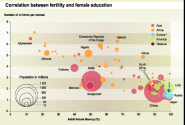Good thoughts. But I am wondering just how bad it would be to have 20% lower GDP per capita and 20% more population with a younger population pyramid as would've been the case if China followed its 1990s and 2000s demographic trends.I think the issue is that 1.4B is still too high a population re: resource and job availability; nothing is going to fix that and more births as a still developing country doesn't provide any tangible benefit at a macro level. The same argument for the one child policy can still be made today which is a fixed resource amount to be divided amongst fewer people.
So I think the focus on the one child policy is a moot point and unnecessary - it served its purpose (to prevent China turning out like India with a huge number of non-productive mouths with feet to feed when food availability was not even sufficient for the then population), and it was terminated when those conditions no longer existed.
I believe that a natural population reduction to 800M - 1B would be beneficial for China as it would eliminate a lot of unproductive competition. This is in line with studies done in the 70s/80s which projected the ideal population for China to be in the 700M - 800M range.
In short, I think all this worry about fertility rates at 1.4B pop is premature... and to put some perspective on things, the most I have heard about China's fertility rate is from US media.
China still wouldn't be India. India's problems are from a lack of land reform and ethnic policy, not merely population. Dispossessed tenant farmers is the root cause of urban slums, and China has solved that.
Yes there will still be more people engaged in manual labor but they're a market too. Yes social competition will be high but not like today where people "can't afford to lose on the starting line". Social pressure comes in 2 forms. 1 is how hard it is to get a good job or school slot, which does get harder with more people. On the other hand is the price of failure. Lower fertility with existing high population means harder to get what you want but also higher price of failure.
In 1980s China only 10% of graduates were allowed to pass gaokao. Even in 1998 after expanding higher education it was in the 20% level. Yet it wasn't that bad if you didn't pass because you had siblings or cousins and not all the pressure was on you.

